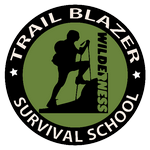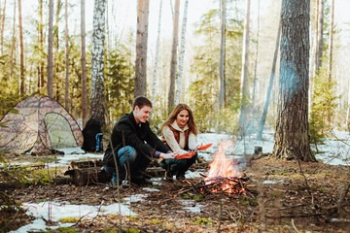At Trail Blazer Survival School, we’ve always emphasized the importance of survival skills in emergency situations. However, safety isn’t just about reacting to emergencies—it’s also about preventing them in the first place. Whether you’re a seasoned camper or new to the outdoors, these essential tips are designed to help your family enjoy camping safely, particularly if you’re camping with young children.
Why Family Camping Safety Matters
Camping is a wonderful way to connect with nature and spend quality time with your family. But it’s easy for things to go wrong if you’re unprepared. By following these tips, you can prevent common camping mishaps and ensure that your family’s trip is memorable for all the right reasons.
1. Never Eat in the Tent
Eating inside your tent might seem convenient, but it can attract unwanted wildlife. Animals are drawn to the scent of food, and you don’t want to share your sleeping space with curious critters. Designate a specific area for meals and snacks, away from your sleeping quarters.
2. Respect the Campfire
Campfires are one of the joys of camping, but they can be dangerous if not handled properly. Children should never play around the fire, and they should never add or remove anything from it. Always supervise kids around the campfire and ensure it’s extinguished before bedtime.
3. Always Wear a Whistle
A whistle is a simple yet effective safety tool. If a child gets lost or feels unsafe, they can blow the whistle to alert adults to their location. Make sure your kids understand that the whistle is not a toy but an important safety device.
4. No Barefoot Adventures
While it might be tempting for kids to run around barefoot, it’s not safe. Campsites can have hidden dangers like broken glass, sharp rocks, tent pegs, or even hot coals. Make sure everyone keeps their shoes on to avoid unnecessary injuries.
5. Minimize Horseplay
Camping is fun, but roughhousing can lead to accidents, especially around tents and campfires. Tripping over tent lines or falling into the fire are serious risks. Encourage your kids to play safely and be mindful of their surroundings.
6. Stick with a Buddy
The buddy system is a simple yet effective way to ensure safety. Children should always stay in pairs or with an adult, especially when venturing away from the campsite. It’s crucial that kids understand they should never wander off alone.
7. Avoid Eating Wild Plants and Touching Wildlife
Teach your children that not everything in the wild is safe to eat or touch. Many plants look edible but are actually poisonous, and wild animals can be dangerous. Make sure your kids know to avoid berries, mushrooms, and wildlife unless they are with a knowledgeable adult.
8. Only Drink Purified Water
While a mountain stream may look clean, it can still harbor harmful microbes and parasites. Always use purified water for drinking, and if necessary, carry a water filter to ensure the water is safe.
9. Stay Away from Water Without Supervision
Children should only approach lakes, ponds, or rivers when accompanied by an adult. Water can be unpredictable, and it’s essential to supervise any water-related activities closely.
10. Set Up a Kitchen Area
To avoid attracting animals to your sleeping area, prepare and eat food in a designated kitchen area, well away from your tent. This simple step can make a big difference in keeping your campsite safe.
11. Pack Appropriate Clothing and Bedding
Weather can change quickly in the outdoors, so be sure to pack layers for cold weather and sun protection for warm days. Ensure your bedding is suitable for the expected nighttime temperatures, and don’t forget rain gear!
12. Be Diligent with Sunscreen and Bug Spray
Sunburns and bug bites can quickly ruin a camping trip. Apply sunscreen regularly, even on cloudy days, and use bug spray to keep ticks and mosquitoes at bay. Check for ticks often, especially on children and pets.
13. Respect the Campfire
If you’re camping with small children, consider using the fire only for cooking, then extinguish it. For older kids, establish strict rules for campfire safety, including keeping the fire small and having water nearby to extinguish it.
14. Establish Boundaries with Children
Set clear boundaries for where your children can and cannot go. Use natural markers like trees or tents to create a safe area they should not leave without an adult.
15. Learn to Identify Poisonous Plants
Teach your children how to identify poison ivy, oak, and sumac. Make it a fun learning experience by exploring the area together and discussing the importance of avoiding these plants.
16. Prevent Carbon Monoxide Poisoning
Never use a camp stove inside a tent to warm up or cook, as it can lead to a dangerous buildup of carbon monoxide. Always cook outside and ensure your tent is well-ventilated.
17. Pack for the Rule of 3s
- 3 Hours Without Shelter: If camping in cold weather, pack appropriate clothing layers, a well-insulated sleeping bag, and a sleep pad.
- 3 Days Without Water: Bring enough water for each family member, and carry a water filter.
- 3 Weeks Without Food: While food is important, shelter and water take priority. Pack easy-to-prepare meals and the tools needed to cook them.
18. Don’t Forget the Essentials
- Fire-making Tools: Fire is crucial for warmth, cooking, and safety.
- Rain Gear: Make sure your jackets and shelter items are waterproof.
- First Aid Kit: A quality first aid kit is a must for treating any injuries that occur.
- Lighting: Bring flashlights, lanterns, and extra batteries.
- Navigation Tools: Maps, a compass, or a GPS device are essential for finding your way.
- Toilet Paper: Because nature doesn’t provide everything!
Enjoy Camping with Confidence
Camping with your family can be a rewarding experience filled with adventure and bonding. By following these safety tips, you can ensure that your trip is not only fun but also safe. At Trail Blazer Survival School, we’re passionate about helping families enjoy the outdoors while staying informed and prepared.
Want more expert advice on outdoor safety and survival? Join our Survival Picks Newsletter for the latest tips, product reviews, and articles designed to keep your family safe and your love for the outdoors alive.

